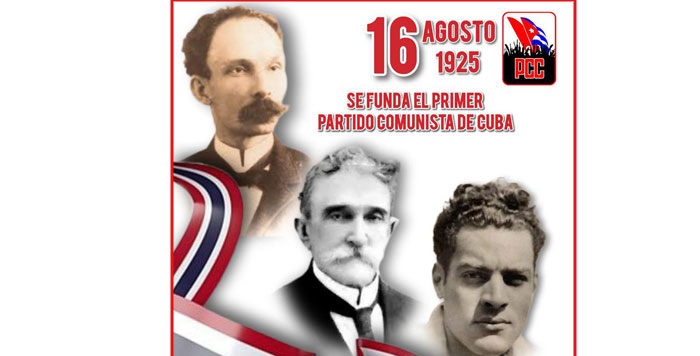
Havana, August 16 (RHC) -- "Today, 99 years ago, a handful of revolutionaries met in Havana to found the first Communist Party of Cuba, the glorious predecessor of the current one. We will always admire our precursors," wrote Roberto Morales Ojeda, Secretary of Organization of the Central Committee of the Communist Party of Cuba.
Cuba commemorates this August 16th as the date of the founding in 1925 of the first Communist Party of Cuba, with a Marxist-Leninist orientation and an expression of the continuity of the emancipatory struggles in the Caribbean country.
According to historical notes, an old house in the Vedado residential area of the capital welcomed some 17 delegates from various communist groups, convened by the revolutionaries Carlos Baliño, Julio Antonio Mella and José Miguel Pérez, at that time its first general secretary.
In this context, the contributions to the nascent political organization of Baliño, the veteran combatant who joined the National Hero, José Martí, in the creation of the Cuban Revolutionary Party, and Mella, the student leader fervent defender of the Apostle's ideology, were decisive.
Like other forces of the same kind that emerged around the 1920s, the Party joined the Third International, founded by Vladimir Ilich Lenin, the leader of the first socialist revolution in the world, in Russia.
Despite not having a solid theoretical knowledge of communism, its members proposed programs of demands for workers and peasants, and carried out activities for the rights of women and youth.
This founding moment, together with the creation, days before, of the National Workers' Confederation of Cuba, meant a new boom in union struggles against the regime of Gerardo Machado (1925-1933), a general of the war of independence who undertook a fierce repression against the Party.
Within only 15 days of being founded, the political group had to go into absolute clandestinity, since, under the pretext of being Spanish, the elected general secretary was deported and several of its members were arrested, including Baliño, who died the following year.
For his part, Mella suffered judicial proceedings and the incipient labor movement was repressed, as part of the persecution and prohibitions established by the Machado regime, which prevented the public life of that political force, illegal on the island until 1938.
The members of that political affiliation were recognized for their honesty, prestige and self-denial, qualities that earned them enormous prestige among the forces that aspired to the sovereignty and independence of Cuba.
History highlights the performance of communist leaders at the head of the labor movement such as Jesús Menéndez and Aracelio Iglesias, Lázaro Peña, or intellectuals of the caliber of Juan Marinello and Carlos Rafael Rodríguez.
With the triumph of the Cuban revolution in 1959, a process of unification of the forces that fought the regime of Fulgencio Batista (1952-1959) took place. The Popular Socialist Party joined the 26th of July Movement and the 13th of March Revolutionary Directorate in the Integrated Revolutionary Organizations (ORI) in 1961.
The ORI became, almost a year later, in 1962, the United Party of the Socialist Revolution of Cuba, until in October 1965 it resumed the name of the Communist Party of Cuba. (Source: Prensa Latina)

